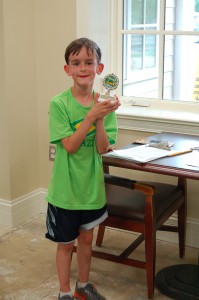I learned something about Simon’s anxiety this weekend. It’s better—better than it used to be and better than my own (which is also better than it used to be).
The whole story began Sunday night nine days ago, when my phone rang at about 9:00 p.m. It was one of Simon’s tennis coaches calling to suggest that we sign him up for a novice, 10 and under boys singles tournament the following Saturday. The catch was that we had to register by an 11:59 deadline.
My immediate thought was “why not?”, followed by “this will be fun!”, followed by completing the paperwork, followed by having massive anxiety. Was Simon ready for this? Shouldn’t he have have completed one intermediate clinic and/or match play clinic before a competition? He just got promoted from advance beginner 9 & 10 to intermediate 9 & 10, but this seemed a bit premature. What if all the other kids were 10 and future Nadals? What if Simon got humiliated on the court? What if the whole thing was traumatic and turned him off the sport or put him in therapy?
It wasn’t pretty. We signed him up for a Thursday private lesson to get ready, review the scoring, work on his serve, and alleviate my anxiety. Saturday at 2:00 it was game time.
My stomach felt wobbly.
Tennis tournaments are nothing like soccer tournaments. The kids are responsible for making their own line calls, for starters, with a ref coming over only to watch a few points if a kid calls him or her over after too many perceived bad calls. The parents aren’t guaranteed a decent view, either. If your kid is playing on a back court, you can’t see much. Finally, what with it being an individual sport, your kid has no one else to lean on, blame, or take comfort from. It’s all on their narrow shoulders.
As luck would have it, Simon ended up having the longest day of anyone. Seven boys signed up for the tournament. The top seed, who was in Simon’s half of the bracket, got a bye in the first round. Then player number 8 withdrew the day before the match, giving someone else a bye in the bottom half of the bracket. Then player number 5 or 6 withdrew after one match and a half set.
What this meant is the that the winner played two matches: He beat Simon and then another competitor. The second place finisher, the one beaten by the winner in the final, only played one match and half a set in the entire tournament! He won his first match against player 8 by default, then won his second match after 3 games in the opening set, also by default when that kid withdrew. Then he lost the only full match he played and took home the second place trophy. Crazy!
Another child lost two matches, one to player 5 or 6 in the only match he completed and then to Simon in the consolation bracket. Player 4, a boy named Krish, played two matches: Simon’s opening match at 2:00 p.m. and then the consolation final match at 5:00 p.m., also against Simon. The difference was that Krish had no one to play in between due to withdrawals, whereas Simon played two matches in between with nothing more than one 5-minute break and one 10-minute break in 4 matches and 3 1/2 hours of tennis.
He played his heart out, won the first set of the consolation final, and then the bottom dropped out and he lost. His considerable get-up-and-go had gone up and went. I honestly don’t know how he lasted as long as he did. He played so long that his back was sore the next morning, and when he stumbled off the court he was close to tears from exhaustion.
Frankly, the whole thing seemed terribly unjust to me. How could Simon finish fourth when he won more matches than anyone other than the tournament winner? How could he finish behind one kid who played only one full match and another that he beat 3 out of 4 sets? How could a final be fair when on child had gotten a two-hour break between matches and the other had played continuously?*
Mama was stressed and feeling the injustice. I didn’t say much to Simon other than to praise him for his effort, endurance, and composure. If Simon thought anything was unfair, he didn’t let it show. When he was beaten 4-1 4-0 by an older, much better player, he neither pouted nor gave up. He was a champ.
With an experience this intense, I had to wonder if it was fun. It would not have been fun for me. Heck, it was hard for me to just watch!
So tonight it came up naturally in the car. I slipped in the question as casually as possible.
“So Simon? Was the tournament as much fun as a Sunday clinic or was it more fun?”
“Oh, it was more fun. Because it was, like, more competitive.”
To me, the second sentence contradicts the first. I like some forms of competition, but the idea of live, intense athletic competition makes we want to pass out or vomit. Apparently, Simon feels things differently. He is still sensitive and still a perfectionist, but has somehow learned to feed off of the adrenaline of competition instead of being crippled by it. Somewhere in that almost fragile looking body of his there is a steely spine that’s getting stronger by the day. Count me as surprised as I am delighted.
*Simon’s four matches: He won his first 4-2 4-1. Then he lost the semi-final in the winner’s bracket 1-4 0-4. That bumped him to the consolation bracket, where he won 4-0 4-0. That put him in the consolation final, which he went on to lose 4-3 0-4 0-1 (tiebreak).
